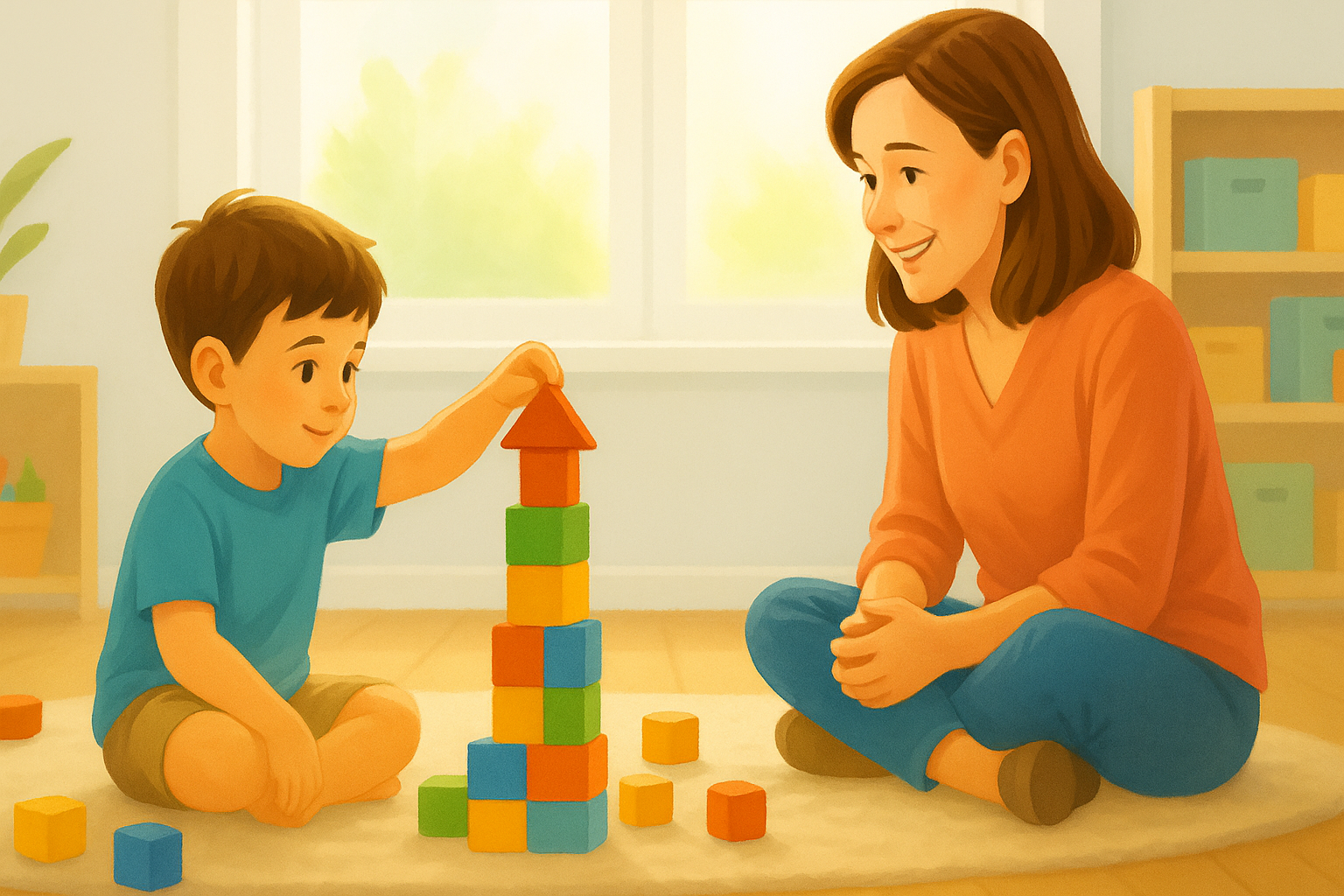
specialised behaviour support for children in liverpool
19 June, 2025
Latest Update: November 20, 2025
Key Highlights
-
Specialised behaviour therapy works by making plans just for the child. This helps deal with challenging behaviours in kids and aims to make their quality of life better.
-
The therapy uses positive behaviour support ideas. These include making safe places, helping kids get new skills, and trying not to use strict or harsh ways.
-
Families living in Liverpool, as well as in suburbs like Casula, Moorebank, Wattle Grove, Prestons, Mount Pritchard, Lurnea, Hinchinbrook, Chipping Norton, Green Valley, and Miller, can get support that fits their needs through the National Disability Insurance Scheme (NDIS).
-
Skilled behaviour support practitioners use proven ways. This includes doing functional behaviour assessments and making support plans.
Introduction
If your child in Liverpool is struggling with behaviours that disrupt learning or relationships, specialised NDIS behaviour support may help. Tailored plans using positive behaviour support can reduce concerning behaviours and create an environment for success. Families in Liverpool and nearby areas can access help through the NDIS, making it easier to secure necessary resources and support.
Understanding Specialised Behaviour Support for Children in Liverpool
 Specialised behaviour therapy assists young people struggling with their behaviour, tailoring support to individual needs. This approach not only addresses challenging behaviours but also teaches essential life skills, helping children manage emotions and socialise effectively. Recognising each child as a unique individual, specialist behaviour support adapts its methods to suit them best.
Specialised behaviour therapy assists young people struggling with their behaviour, tailoring support to individual needs. This approach not only addresses challenging behaviours but also teaches essential life skills, helping children manage emotions and socialise effectively. Recognising each child as a unique individual, specialist behaviour support adapts its methods to suit them best.
How Specialised Behaviour Therapy Differ from Standard Methods
Specialised behaviour therapy focuses on helping children change certain actions by using plans like Applied Behaviour Analysis (ABA). This kind of therapy is different from traditional therapy, which looks at deep emotional problems. Here, the main goal is to see visible progress in children who have special needs.
Traditional methods might try to give fast answers, but positive behavioural support works to find out the cause of the behaviour and then responds in a way that fits the child. A behaviour analyst is there to help the family. They create detailed plans that look at the child’s behaviour right now and teach new ways to cope.
These plans are made for both home and school. They also give hands-on tips for real change. In the end, this care helps children and their families see better and lasting results when it comes to behaviour problems.
Understanding NDIS Funding for Specialised Behaviour Support
To access behaviour support through the National Disability Insurance Scheme (NDIS), families in Liverpool should check that their plan includes the correct funding categories and align supports accordingly.
Common Support Categories
-
Capacity Building – Improved Relationships – often used for behaviour support where the aim is to improve social participation, reduce behaviours of concern and build relationships.
-
Capacity Building – Improved Daily Living – when the behaviour is impacting daily routines, school attendance, transition or community access.
-
Early Childhood Early Intervention (ECEI) – for younger children requiring early behaviour-support intervention.
What to Ask Your Provider
-
“Is the practitioner a behaviour support practitioner registered with the NDIS Commission?”
-
“Will the service include a Functional Behaviour Assessment (FBA) and a tailored Behaviour Support Plan (BSP)?”
-
“Will we get data tracking and measurable outcomes (e.g., reduction in meltdowns, improved transitions) that support our next plan review?”
-
“Are home, school and community settings included in the plan (where behaviour happens)?”
Recognising When Your Child Might Benefit from Behaviour Therapy
Have you noticed your child acting out despite normal parenting? Signs like intense emotions or excessive quietness may indicate a need for extra support. Early intervention is crucial to prevent worsening behaviour. Many families benefit from targeted support when addressing common behaviour challenges like self-regulation and emotional outbursts. Children require assistance at home, school, and in social settings. Implementing positive behaviour strategies can foster their growth and success. Recognising when your child struggles with emotions or making friends is the first step. Acting early gives your child the best chance to thrive. Behaviour therapy can address issues stemming from various conditions. Below is a table of common conditions this therapy can help with:
|
Condition |
Support Offered |
|---|---|
|
Autism Spectrum |
Teaching social skills, managing sensory needs, and improving communication abilities. |
|
Mental Health |
Coping strategies for anxiety, frustration, and self-regulation practices. |
|
Speech Delays |
Involvement of speech pathologists to enhance understanding and expression. |
Therapy helps each child find their own way to do well, even when they deal with these conditions. It looks at what causes problems and how kids act. With the help of support networks, children can get past problems that come up in daily life. This helps them have better days and feel good about what they do.
Recognising the early signs can make a big difference in your child’s development. If you’re wondering whether your child’s behaviours are typical or might indicate a need for professional help, here's our guide on the key signs your child may need behavioural therapy. It covers common emotional, social, and developmental red flags — especially relevant for families navigating NDIS support in Liverpool.
What’s New in Specialised Behaviour Support in Liverpool
In 2025, behaviour support services in the Liverpool region have expanded to reflect new best practices and regulatory guidance. The NDIS Quality & Safeguards Commission emphasises that behaviour support practitioners must follow the Positive Behaviour Support Capability Framework, use functional assessments (FBAs) and develop behaviour support plans (BSPs) that are explicitly linked to a participant’s NDIS goals.
Key changes:
-
More mobile, in-home and school-based delivery models, supporting children in the surroundings where behaviour happens.
-
Increased focus on data-tracking, measurable outcomes and goal reviews, which strengthens NDIS plan reviews.
-
Stronger inclusion of families and schools as active collaborators, meaning your child’s plan now should align across home, school and community.
-
Cultural responsiveness and localised support: Liverpool’s diverse communities are better served by providers who understand local schools, languages, family structures and community routines.
What Does a Behaviour Support Practitioner Do?
 A behaviour support practitioner works closely with each child to get to know their needs. They make plans just for that child and also talk with families and teachers. A vital first step is conducting a Functional Behaviour Assessment to understand what triggers and maintains your child’s behaviours. Their main goal is to help build good behaviour and handle any tough behaviours, so the child can do well both at home and at school. With this help, children can do their best and feel good in daily life.
A behaviour support practitioner works closely with each child to get to know their needs. They make plans just for that child and also talk with families and teachers. A vital first step is conducting a Functional Behaviour Assessment to understand what triggers and maintains your child’s behaviours. Their main goal is to help build good behaviour and handle any tough behaviours, so the child can do well both at home and at school. With this help, children can do their best and feel good in daily life.
Accessing Specialised Behaviour Therapy in Liverpool under the NDIS
Families in Liverpool and surrounding suburbs—including Casula, Moorebank, Prestons, Lurnea, Chipping Norton, Wattle Grove, and Warwick Farm—can access specialised behaviour therapy through the National Disability Insurance Scheme (NDIS). This funding allows eligible children and their families to receive personalised behaviour support tailored to their individual needs and developmental goals.
At daar, our team of NDIS-registered practitioners provides evidence-based behavioural interventions through a flexible range of services. Every therapist is trained in Positive Behaviour Support (PBS), with a focus on reducing challenging behaviours and helping children build daily living, emotional, and communication skills. Whether you're based in Liverpool city or surrounding areas like Hoxton Park, Hinchinbrook, or Green Valley, our local expertise makes it easier to get the support your child needs.
Navigating the NDIS Process for Behaviour Support
The NDIS helps families find support services, including positive behavioural support. To start, you need to apply for funding. This is often for things like early intervention or making skills better. When your application gets approved, you will meet with a planner. At this meeting, you talk about your goals. The planner will then help you make a support plan that sets aside money for therapies, like positive behaviour support.
Support services you trust can help you fill out paperwork. They can also help with any rules about restrictive practices. For families living in Liverpool, there are groups you can join. These groups give you guidance and make the NDIS process easier and better for you.
Finding Qualified Behaviour Therapists in Liverpool
Finding behaviour support specialists in Liverpool can be challenging for families. Our team is composed of NDIS-registered practitioners. We design each plan based on how PBS strategies are personalised to match your child’s strengths, challenges, and family context.
We focus on evidence-based strategies and work closely with parents, schools, and support networks to ensure consistent care across all environments. Whether you need in-person sessions or flexible telehealth options, our team supports families across Casula, Moorebank, Prestons, Chipping Norton, and Wattle Grove. Choosing a therapist who understands both your child’s behaviour and your goals can make all the difference in long-term progress.
Book your consultation to learn how our behaviour therapy services can help your child build positive skills and achieve lasting outcomes through personalised care.
Frequently Asked Questions
What Does Specialised Behaviour Support Mean Under the NDIS?
Specialised Behaviour Support (SBS) under the NDIS (National Disability Insurance Scheme) refers to evidence-informed, person-centred interventions designed to improve the quality of life of individuals who display behaviours of concern. These supports aim to reduce the impact of challenging behaviours by understanding their root causes and implementing Positive Behaviour Support (PBS) strategies.
Under the NDIS, Specialised Behaviour Support is delivered by qualified Behaviour Support Practitioners and is regulated by the NDIS Quality and Safeguards Commission. These services are included in the Improved Relationships support category for eligible participants.
What qualifications do behaviour support practitioners need?
A behaviour analyst and support practitioner specialises in understanding human behaviour, trained in psychology or behaviour analysis. Behaviour analysts often collaborate with speech pathologists and occupational therapists. Working with NDIS-registered groups ensures adherence to regulations, enhancing the child's quality of life.
Is behaviour therapy covered by the NDIS for all children?
Many NDIS participants and young individuals needing early intervention can access behaviour therapy through the National Disability Insurance Scheme. This service, available to people of all ages, falls under improved relationships and other key support groups. It aims to promote independence and manage challenging behaviours. Eligibility depends on your NDIS plan.
.svg)

















